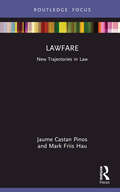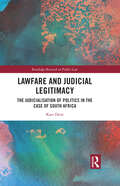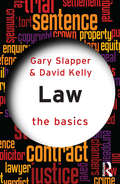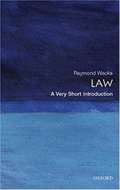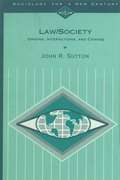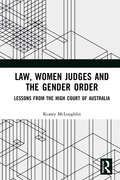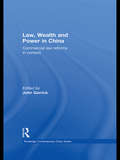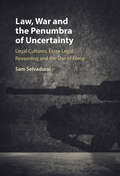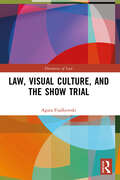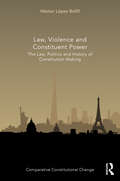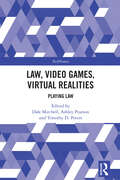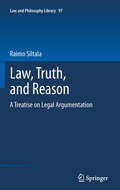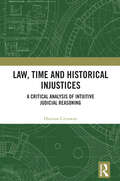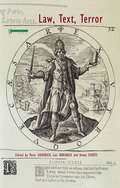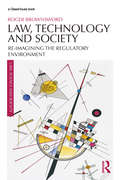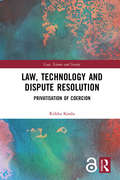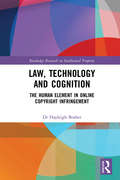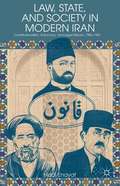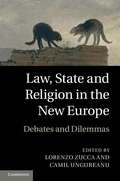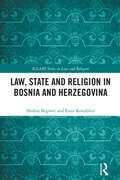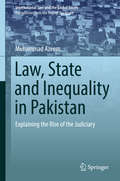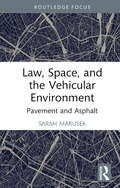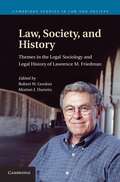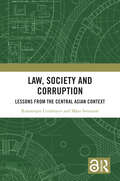- Table View
- List View
Lawfare: New Trajectories in Law (New Trajectories in Law)
by Jaume Castan Pinos Mark Friis HauThis book develops a new conceptualisation of lawfare that recognises the polysemantic nature of the term. Drawing on theoretical developments from legal anthropology, international relations, and social theory, the book scrutinises the multiple dimensions of this phenomenon. It illustrates the multifaceted character of lawfare with a wide range of historical and contemporary cases from across the globe and analyses the implications of actors pursuing political objectives through legal means. This includes the use of lawfare by states as a legal instrument to accomplish geopolitical objectives, domestic lawfare, or the use of legal instruments to undermine internal opposition, and state lawfare used by governments to ‘protect’ the state from internal territorial-secessionist challenges. Finally, the book shows that lawfare is not exclusively a tool for hegemonic actors, as it can also be used by civil society actors that aim to uphold their rights through legal instruments in asymmetric lawfare. This book contributes to new developments in lawfare without shying away from controversy, acknowledging its sometimes-brutal efficacy as well as its potential pitfalls. The book will appeal to scholars and students of law, international relations, political science, anthropology, and sociology.
Lawfare and Judicial Legitimacy: The Judicialisation of Politics in the case of South Africa (Routledge Research in Public Law)
by Kate DentLawfare is a complex and evolving concept with many permutations. It is a term that is used to describe both a judicialisation of politics where the Constitutional Court is called upon to uphold constitutional responsibilities, compensating for institutional failures in the broader democratic space, and instances where there is abuse of the legal process to escape accountability. When the court is dragged into politics, it forces an examination of the legitimate scope of judicial review. This book explains how judicialisation of politics leads to the politicisation of adjudication and further weaponisation of the law. Exploring the judicial-political dynamics of South Africa from 2009 onwards, the work traces the consequences of the judicialisation of politics for institutional resilience and broader constitutional stability. Through an in-depth study of judicial legitimacy, the book seeks to provide an overarching theoretical justification for the dangers that inhere in lawfare. It analyses the potential costs of both judicial statesmanship and strategies of deference and avoidance when trying to navigate the Court safely through the era of lawfare. South Africa offers an interesting crucible within which to observe an unfolding global trend. Strengthened by its comparative focus, the implications of lawfare presented in this book transcend the South African context and are applicable to other jurisdictions in the world. The book will be of interest to researchers, academics and practitioners working in the areas of Constitutional Law and Politics.
Law: The Basics (The Basics)
by David Kelly Gary SlapperAn engaging introduction to one of the most complex areas of modern life. The book introduces both the main components of the legal system - including judges, juries and law-makers - and key areas of law - contract, civil negligence, and criminal law - to provide the uninitiated with an ideal introduction to law. Key questions to be considered include: How are laws made? How do judges decide cases? What is the exact role of the EU in the legal system? What are your rights and duties under contract law? What is a crime and what are criminal defences? Throughout the book, a wide range of contemporary cases are examined to relate key legal concepts to familiar examples and real world situations.
Law: A Very Short Introduction
by Raymond WacksLaw underlies our society --it protects our rights, imposes duties on each of us, and establishes a framework for the conduct of almost every social, political, and economic activity. The punishment of crime, compensation of the injured, and the enforcement of contracts are merely some of the tasks of a modern legal system. It also strives to ensure justice, promote freedom, and protect our security. The result is a system that, while it touches all of our daily lives, is properly understood by only a few, with its impenetrable jargon, obsolete procedures, and interminable stream of Byzantine statutes and judgments of the courts. This clear, jargon-free Very Short Introduction cuts introduces the essentials of law and legal systems in a lively, accessible, and stimulating manner. Explaining the main concepts, terms, and processes of the legal system, it focuses on the Western tradition, but also examines other legal systems, such as customary law and Islamic law. And it looks to the future too, as globalization and rapid advances in technology place increasing strain on our current legal system.
Law/Society: Origins, Interactions, and Change
by John R. SuttonLaw/Society aims to familiarize students with the foundational issues, debates, and literatures in the sociology of law. It is written for students who have some background in the social sciences.
Law, Women Judges and the Gender Order: Lessons from the High Court of Australia
by Kcasey McLoughlinThis book seeks to understand how women judges are situated as legal knowers on the High Court of Australia by asking whether a near-equal gender balance on the High Court has disrupted the Court’s historically masculinist gender regime. This book examines how the High Court’s gender regime operates once there is more than one woman on the bench. It explores the following questions: How have the Court’s gender relations accommodated the presence women on the bench? How have the women themselves accommodated those pre-existing gender relations? How might legal judgments and reasoning change as a result of changing gender dynamics on the bench? To develop answers to these (and other) questions the book pursues a methodology that conceptualises the High Court as an institution with a particular gender regime shaped historically by the dominant gender order of the wider society. The intersection between the (gendered) individuals and the (gendered) institution in which they operate produces and reproduces that institution’s gender regime. Hence, the enquiry is not so much asking ‘have women judges made a difference?’ but rather is asking how should we understand women judges’ relationship with the law, a relationship that is shaped as much by the individual judge as by the institutional context in which they operate. Scholars, legal practitioners and researchers interested in judicial reasoning, gender diversity and the legal profession, gender and politics will be interested in this book because it breaks new ground as a case study of a Court’s gender regime at a particular time.
Law, Wealth and Power in China: Commercial Law Reforms in Context (Routledge Contemporary China Series)
by John GarrickThis book examines the law reforms of contemporary China in light of the Party-state’s ideological transformation and the political economy that shapes these reforms. This involves analysing three interrelated domains: law reform, power and wealth. The contributors to this volume employ a variety of perspectives and analytical techniques in their discussion of key themes including: commercial law reform and its governance of wealth and regulation of economic activity; the influence and authority of the Party-state over China’s economic activity; and the influence of wealth and the wealthy in economic governance and legal reform. Utilizing an interdisciplinary approach, this book presents analytical perspectives of new work, or new lines of thinking about the new wealth, power and law reforms of China. As such, critical boundaries are explored between legal and financial reforms and what these reforms signify about deeper ideological, economic, social and cultural transformations in China. The book concludes by asking whether there is a ‘China model’ of development which will produce a unique variety of capitalism and indigenous variant of rule of law, and examining the ‘winners and losers’ in the transition from a centrally planned economy to a market economy. Law, Wealth and Power in China will be of interest to students and academics of comparative law, Asian law, Chinese economics and politics, Chinese Studies, as well as professionals in investment banking, finance and government.
Law, War and the Penumbra of Uncertainty: Legal Cultures, Extra-legal Reasoning and the Use of Force
by Sam SelvaduraiThis book argues that lawyers must often rely on contestable ethical and strategic intuitions when dealing with legal and factual uncertainties in 'hard cases' of resort to force. This area of international law relies on multiple tests which can be interpreted in different ways, do not yield binary 'yes/no' answers, and together define 'paradigms' of lawful and unlawful force. Controversial cases of force differ from these paradigms, requiring lawyers to assess complex, incomplete factual evidence, and to forecast the immediate and long-term consequences of using and not using force. Legal rules cannot resolve such uncertainties; instead, techniques from legal risk management, strategic intelligence assessment and political forecasting may help. This study develops these arguments using the philosophy of knowledge, socio-legal, politico-strategic and ethical theory, structured interviews and a survey with 31 UK-based international lawyers, and systematic analysis of key International Court of Justice cases and scholarly assessments of US-led interventions.
Law, Visual Culture, and the Show Trial (Discourses Of Law Ser.)
by Agata FijalkowskiAddressing the relationship between law and the visual, this book examines the importance of photography in Central, East, and Southeast European show trials. The dispensation of justice during communist rule in Albania, East Germany, and Poland was reliant on legal propaganda, making the visual a fundamental part of the legitimacy of the law. Analysing photographs of trials, this book examines how this message was conveyed to audiences watching and participating in the spectacle of show trials. The book traces how this use of the visual was exported from the Soviet Union and imposed upon its satellite states in the immediate aftermath of World War II. It shows how the legal actors and political authorities embraced new photographic technologies to advance their legal propaganda. Drawing on contemporary theoretical work in the area, the book then challenges straightforward accounts of the relationship between law and the visual, critically engaging entrenched legal historical narratives, in relation to three different protagonists, to offer the possibility of reclaiming and rewriting past accounts. As its analysis demonstrates, the power of images can also be subversive; and, as such, the cases it addresses open onto contemporary questions about law and its inherent performativity. This original and insightful engagement with the relationship between law and the visual will appeal to legal and cultural theorists, as well as those with more specific interests in Stalinism, and in Central, East, and Southeast European history.
Law, Violence and Constituent Power: The Law, Politics And History Of Constitution Making (Comparative Constitutional Change)
by Héctor López BofillThis book challenges traditional theories of constitution-making to advance an alternative view of constitutions as being founded on power which rests on violence. The work argues that rather than the idea of a constitution being the result of political participation and deliberation, all power instead is based on violence. Hence the creation of a constitution is actually an act of coercion, where, through violence, one social group is able to impose itself over others. The book advocates that the presence of violence be used as an assessment of whether genuine constitutional transformation has taken place, and that the legitimacy of a constitutional order should be dependent upon the absence of killing. The book will be essential reading for academics and researchers working in the areas of constitutional law and politics, legal and political theory, and constitutional history.
Law, Video Games, Virtual Realities: Playing Law (TechNomos)
by Ashley Pearson Dale Mitchell Timothy D. PetersThis edited volume explores the intersection between the coded realm of the video game and the equally codified space of law through an insightful collection of critical readings. Law is the ultimate multiplayer role-playing game. Involving a process of world-creation, law presents and codifies the parameters of licit and permitted behaviour, requiring individuals to engage their roles as a legal subject – the player-avatar of law – in order to be recognised, perform legal actions, activate rights or fulfil legal duties. Although traditional forms of law (copyright, property, privacy, freedom of expression) externally regulate the permissible content, form, dissemination, rights and behaviours of game designers, publishers, and players, this collection examines how players simulate, relate, and engage with environments and experiences shaped by legality in the realm of video game space. Featuring critical readings of video games as a means of understanding law and justice, this book contributes to the developing field of cultural legal studies, but will also be of interest to other legal theorists, socio-legal scholars, and games theorists.
Law, Truth, and Reason
by Raimo SiltalaThis book is an innovative contribution to analytical jurisprudence. It is mainly based on the distinct premises of linguistic philosophy and Carnapian semantics, but also addresses the issues of institutional philosophy, social pragmatism, and legal principles as envisioned by Dworkin, among others. Wróblewski´s three ideologies (bound/free/legal and rational) and Makkonen´s three situations (isomorphic/semantically vague/normative gap) of judicial decision-making are further developed by means of 10 frames of legal analysis as discerned by the author. With the philosophical theories of truth serving as a reference, the frames of legal analysis include the isomorphic theory of law (Wittgenstein, Makkonen), the coherence theory of law (Alexy, Peczenik, Dworkin), the new rhetoric and legal argumentation theory (Perelman, Aarnio), social consequentialism (Posner), natural law theory (Fuller, Finnis), and the sequential model of legal reasoning by Neil MacCormick and the Bielefelder Kreis. At the end, some key issues of legal metaphysics are addressed, like the notion of legal systematics and the future potential of the analytical approach in jurisprudence.
Law, Tropical Forests and Carbon
by Rosemary Lyster Catherine MacKenzie Constance Mcdermott Rosemary Lyster Catherine MackenzieEmerging from the scientific parameters underpinning REDD+ (including the measurement of carbon stocks, reporting and verification), Law, Tropical Forests and Carbon considers the crucial challenges for global and national governance and the legal rights and interests of indigenous people and local communities, all of which have fundamental implications for development and poverty alleviation. With contributions from leading experts in the fields of law, governance, science, development studies and geography, it sheds light on the complexity of REDD+ and offers perspectives on the extent to which REDD+ agreements can be enforced under international law and in concert with new private and public domestic institutions.
Law, Time and Historical Injustices: A Critical Analysis of Intuitive Judicial Reasoning
by Harison CitrawanThis book provides a critical assessment of how judges reason in the adjudication of historical injustices.The practice of adjudication in historical cases of injustice require that, in determining collective responsibility, judges impart meaning to past injuries. This book analyses the narrative mechanisms through which this meaning is produced. Focusing on three areas of adjudication–racial discrimination, post-colonial extractivism and the climate crisis–the book’s analysis focuses on the issue of time. It considers the interplay of how historical injustice adjudication is shaped by temporal presuppositions and how it enacts a particular idea of temporality. As experiences of injustice are narrated, the book demonstrates how some of those experiences are included and others are excluded within the process of adjudication. Drawing on legal theory, legal epistemology and the philosophy of time, the book thus offers an instructive, and provocative, account of how collective responsibility is determined in cases of historical injustice.This book will appeal to scholars working in the fields of legal theory, legal reasoning, socio-legal studies, comparative jurisprudence and transitional justice.
Law, Text, Terror
by Peter Goodrich Lior Barshack Anton SchützThe essays collected here under the governing signs, Law, Text, Terror have their origins in a singular and topical desire. Their motive is most immediately that of acknowledging the massive and eccentric contribution of the philologist, psychoanalyst and Romanist jurist Pierre Legendre to the study of legal institutions and juridical practices. He has unceasingly asked the question 'why law?' and in endeavouring to answer that question, in the course of over twenty-five books published during the last forty years, he has traversed a unique and uniquely idiosyncratic body of disciplines and knowledges relevant to the symbolic forms and institutional functions of the Western legal order. These essays reflect that singularity of drive as well as that diversity of scholarly interests by taking up, playing with, varying and developing the themes of text and terror, law and territory, that Legendre either introduced or made peculiarly his own.
Law, Technology and Society: Reimagining the Regulatory Environment (Law, Science and Society)
by Roger BrownswordThis book considers the implications of the regulatory burden being borne increasingly by technological management rather than by rules of law. If crime is controlled, if human health and safety are secured, if the environment is protected, not by rules but by measures of technological management—designed into products, processes, places and so on—what should we make of this transformation? In an era of smart regulatory technologies, how should we understand the ‘regulatory environment’, and the ‘complexion’ of its regulatory signals? How does technological management sit with the Rule of Law and with the traditional ideals of legality, legal coherence, and respect for liberty, human rights and human dignity? What is the future for the rules of criminal law, torts and contract law—are they likely to be rendered redundant? How are human informational interests to be specified and protected? Can traditional rules of law survive not only the emergent use of technological management but also a risk management mentality that pervades the collective engagement with new technologies? Even if technological management is effective, is it acceptable? Are we ready for rule by technology? Undertaking a radical examination of the disruptive effects of technology on the law and the legal mind-set, Roger Brownsword calls for a triple act of re-imagination: first, re-imagining legal rules as one element of a larger regulatory environment of which technological management is also a part; secondly, re-imagining the Rule of Law as a constraint on the arbitrary exercise of power (whether exercised through rules or through technological measures); and, thirdly, re-imagining the future of traditional rules of criminal law, tort law, and contract law.
Law, Technology and Dispute Resolution: The Privatisation of Coercion (Law, Science and Society)
by Riikka KouluThe use of new information and communication technologies both inside the courts and in private online dispute resolution services is quickly changing everyday conflict management. However, the implications of the increasingly disruptive role of technology in dispute resolution remain largely undiscussed. In this book, assistant professor of law and digitalisation Riikka Koulu examines the multifaceted phenomenon of dispute resolution technology, focusing specifically on private enforcement, which modern technology enables on an unforeseen scale. The increase in private enforcement confounds legal structures and challenges the nation-state’s monopoly on violence. And, in this respect, the author argues that the technology-driven privatisation of enforcement – from direct enforcement of e-commerce platforms to self-executing smart contracts in the blockchain – brings the ethics of law’s coercive nature out into the open. This development constitutes a new, and dangerous, grey area of conflict management, which calls for transparency and public debate on the ethical implications of dispute resolution technology.
Law, Technology and Cognition: The Human Element in Online Copyright Infringement (Routledge Research in Intellectual Property)
by Hayleigh BosherThis book considers a new approach to online copyright infringement. Rather than looking at the subject within a purely technological context, it provides legal analysis from a human perspective. This book highlights that there are three key instances in which the capacity of a human mind intersects with the development of copyright regulation: (1) the development of copyright statutory law; (2) the interpretation of the copyright statutory law the judiciary; and (3) human interaction with new technology. Using a novel framework for constructing digital perspectives, the author, Dr Hayleigh Bosher, analyses the laws relating to online copyright infringement. She provides insights into why the law appears as it does, shedding light on the circumstances of how it came to pass and demonstrates a clear malfunction in the interpretation and application of copyright law to online activities that derives from the disconnect between the technological and the human perspectives. The book proposes putting the human element back into copyright analysis to enable the return of reason where it has been lost, and provide a clearer, more consistent and fair legal regulation of online copyright infringement. Law, Technology and Cognition: The Human Element in Online Copyright Infringement will be of interest to students, academics, researchers, as well as practitioners.
Law, State, and Society in Modern Iran
by Hadi EnayatUsing a 'Historical Institutionalist' approach, this book sheds light on a relatively understudied dimension of state-building in early twentieth century Iran, namely the quest for judicial reform and the rule of law from the 1906 Constitutional Revolution to the end of Reza Shah's rule in 1941.
Law, State and Religion in the New Europe
by Lorenzo Zucca Camil UngureanuThe return of religion to the public sphere raises various dilemmas. Rights and values, pluralism and identity, justice and efficacy, autonomy and tradition, and integration and toleration cannot always be balanced without the loss of something valuable. This volume of essays tackles such dilemmas from two perspectives. To begin, major contemporary theorists rethink the place of religion in the public sphere from republican, liberal and critical-theoretical viewpoints. Contributors then bring together theory and practice to better conceptualize and assess the latest developments in European jurisprudence with respect to religion.
Law, State and Religion in Bosnia and Herzegovina (ICLARS Series on Law and Religion)
by Nedim Begović Emir KovačevićThis book explores relations between state, religion and law in Bosnia and Herzegovina. Historically, multi-religiousness has been a constant feature of the Bosnian polity, from its creation in 12th century until modern times. Since the middle of the 19th Century, Catholics have tended to self-identify as Croats, Orthodox Christians as Serbs, and Muslims as Bosniaks. Moreover, in a region that has undergone significant recent transformation, from the communist to the liberal political system, Bosnia and Herzegovina represents a very interesting case for the study of the relationship between state and religion. This book includes a short overview of historical aspects of these relations and a detailed analysis of the existing constitutional and legal framework on freedom of religion and relations between the state and religious communities. It assesses the actual implementation in practice, including the relevant national courts’ case-law. The work covers both the developments of new legal standards, while also identifying the main obstacles in their implementation. At a time when the region is again the subject of much interest, this book will be essential reading for those working in the areas of Law and Religion, Constitutional Law and Transitional Justice.
Law, State and Inequality in Pakistan
by Muhammad AzeemThrough a detailed historical and empirical account of post-independence years, this book offers a new assessment of the role of the judiciary in Pakistani politics. Instead of seeing the judiciary as helpless or struggling against an authoritarian state, it argues that the judiciary has been a crucial link in the creation of state and political inequality in Pakistan. This rubs against the central role given to the judiciary in developing countries to fix the 'corrupt politicians and stubborn bureaucracies' in the World Bank's 'Good Governance' paradigm and rule of law initiatives. It also challenges the contemporary legal and judicial discourse that extols the virtues of Public Interest Litigation. While the book's core analysis is a critique of the contemporary liberal legal project, it also adds to the critical tradition of social theory by linking political economy to a social theory of law. The theoretical aspect of the study is applicable to any developing society whose judiciary is going through foreign-sponsored 'rule of law' judicial reforms.
Law, Space, and the Vehicular Environment: Pavement and Asphalt
by Sarah MarusekThis book examines the paved road as a liminal space and legal frontier for enlivened, everyday struggles over property, power, and place/definition. Through pavement itself and the pavement-based practices of pavementalities and pavementeering, the road is legally framed as a place for movement. Paved terrain is a site of dynamism between law and place that engenders the road as legal metaphor by calling forth the kinetic notion of jurisprudence in which law can be understood through the fluidity of everyday life. In Western (and particularly American) society, roads are a material locus of governance, in which rights of way are determined, communicated, and enforced. However, roads also constitute a site of resistance or disruption, beyond regulation. Addressing phenomena such as travel, political protest, public memory, and community governance, this book explores the paved medium of asphalt as a complex surface for legality that constitutively frames order against disorder involving jurisdiction tensions, property ownership, and cultural identities in vehicular environments. The target audience of this book are those students and scholars who consider how law works in society, whether through frameworks of (auto) mobility and legal geography or through the interdisciplinary approaches of legal semiotics, legal culture, and/or new materialism.
Law, Society, and History: Themes in the Legal Sociology and Legal History of Lawrence M. Friedman
by Morton J. Horwitz Robert W. GordonThis book assembles essays on legal sociology and legal history by an international group of distinguished scholars. All of them have been influenced by the eminent and prolific legal historian, legal sociologist and scholar of comparative law, Lawrence M. Friedman. Not just a Festschrift of essays by colleagues and disciples, this volume presents a sustained examination and application of Friedman's ideas and methods. Together, the essays in this volume show the powerful ripple effects of Friedman's work on American and comparative legal sociology, American and comparative legal history and the general sociology of law and legal change.
Law, Society and Corruption: Lessons from the Central Asian Context (Law, Justice and Power)
by Rustamjon Urinboyev Måns SvenssonThis book presents new socio-legal perspectives and insights on the social life of corruption and anticorruption in authoritarian regimes.This book takes up the case of Uzbekistan—an authoritarian regime in Central Asia and one of the most corrupt countries in the world according to Transparency International’s Corruption Perceptions Index—and examines the corruption that developed in a tightly closed authoritarian regime permeated by a large-scale shadow economy, a weak rule of law, and a collectivist legal culture. Building on socio-legal frameworks of legal compliance, living law and legal pluralism, the central argument of the book is that the roles, meanings, and logics of corruption are fluid, and depend on a myriad of structural variables, and contextual and situational factors.This book will be of value to researchers, academics, and students in the fields of sociology of law, legal anthropology, and Central Asian studies, especially those with an interest in the intersection of law, society, and corruption in authoritarian regime contexts.
